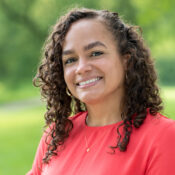
Speaker
Gabrielle Isabel Kelenyi
Coordinator of Multicultural and Social Justice Initiatives in the Department of English
Gabrielle Isabel Kelenyi, M.A., is a Ph.D. candidate studying composition & rhetoric at the UW–Madison College of Letters & Science (L&S) and an Advanced Opportunity Fellow in the L&S Community of Graduate Research Scholars. Kelenyi is a teaching assistant in the English Department, where she serves as coordinator of multicultural and social justice initiatives. Kelenyi’s research interests are community literacies, community-engaged and participatory methodologies, antiracist and social justice writing program administration, writing development across the lifespan, and researching best practices for teaching writing effectively across grade levels.
Speaking in
Implementing an Anti-Racism Rubric for Campus Units
At the 2021 Diversity Forum, the Badger Anti-Racist Coalition (BARC) presented a project to create an anti-racist, liberatory rubric specifically for campus departmental use. The project aimed to help department staff and leaders organize themselves when asking the question: how are we perpetuating racism and oppression right here in our workplace, and what can we do to change that?
This session will update the campus about the implementation of this rubric and will include perspectives of faculty and staff from campus units who have worked through parts of the rubric. Panelists will share lessons learned and suggestions for implementing the rubric for other campus units. The audience will also learn about coming improvements to the rubric based on feedback from these campus units. We see this as a living document to be improved by anti-racist advocates at UW-Madison for years to come.
Session participants will be able to:
- Understand the Anti-Racist Rubric for Campus Units and how it can be applied to other units
- Facilitate discussions about anti-racism within campus units
- Apply the rubric’s 12 domains to changes in policy and practice at the unit level
- Critique oppressive policies and practices they see in their campus units